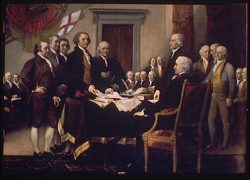
The Steven Salaita case at the University of Illinois continues to engender controversy. The three most perceptive commentaries came from FIRE and Steven Lubet. In comments with which I entirely agree, FIRE condemned the public statement of Illinois chancellor Phyllis Wise, who justified the revocation of Salaita’s offer on the grounds “we cannot and will […]
Read More
The Witherspoon Institute Within a few years of the September 11 attacks, anyone on a university campus could observe the steady growth of programs and institutes promoting global citizenship. By 2009, a number of my students on a study-abroad trip to the Middle East preferred to be known as global citizens rather than Americans. President Obama, […]
Read More
The fight for free speech is growing ever more urgent, argues Greg Lukianoff in Freedom from Speech, his new Encounter Broadside. Lukianoff, the President of the Foundation for Individual Rights in Education (FIRE) and a frequent contributor to Minding the Campus, suggests that the trend of censoring “offensive” content exists on a stage broader than […]
Read More
Here comes PTSS, the latest concoction in the crowded field of group grievance. That would be Post Traumatic Slave Syndrome, the invention of “Dr. Joy,” Joy DuGruy, billed as ” the nationally and internationally renowned” researcher and educator. I will venture a guess that PTSS hasn’t yet caught the attention of many readers of Minding […]
Read More
While mandatory college orientation programs have always veered toward the absurd, they’ve now sunk to new depths. Today Glenn Reynolds (the Instapundit) noted that some of these programs even imply that every male student is a potential rapist. One student thought his college effectively told him that “You’re a rapist, and we’re watching you.” Reynolds says that […]
Read More
The College Fix If you’ve ever wondered what goes on at freshmen orientation sessions at small liberal arts colleges, then a recent post on Reddit will give you some insights. One of the top posts on the site’s MensRights subreddit on Sunday included a detailed account of recent get-to-know-you events at Vassar College, an elite college with 2,450 students […]
Read More
A while back, I wrote a series here at Minding the Campus on the transformation of U.S. history in higher education. In a virtually unprecedented development, the last 10-20 years have featured a conscious decision to restrict, rather than expand, the range of knowledge about U.S. history that college students would receive. Elite departments (and, […]
Read More
In response to questions from the Washington Examiner’s Ashe Schow, a spokesperson for Iowa senator Charles Grassley made a telling admission that has received insufficient attention. “The university,” the spokesperson noted, “will be responsible for any new requirements in the bill and be responsible to find the funds within its budget, whether that be from […]
Read More
History News Network In 2012, the College Board released a new set of standards for the Advanced Placement United States History (APUSH) course. APUSH vanishes some figures who would seem indispensable to any basic history of the United States. This is American history seemingly without Benjamin Franklin, Thomas Jefferson, and James Madison. “Seemingly” is a key word. If you […]
Read More
There’s nothing wrong with the first sentence of the National Bureau of Economic Research’s new report, “Affirmative Action and Human Capital Development,” which defines affirmative action as “the practice of granting preferential treatment to under-represented (UR) demographic groups,” but it’s down hill from there. The descent begins in the second sentence, which states that “It […]
Read More
As student debt continues to climb and reform fails to materialize, it’s not surprising that some politicians are capitalizing on their constituents’ frustration. In fact, some of the brightest stars on both sides of the partisan divide are taking up the cause of student loan reform. Senator Marco Rubio, who seems likely to run for […]
Read More
A group chaired by CUNY Board of Trustees chairman Benno Schmidt recently published a report entitled, “Governance for a New Era.” (I was part of the group, which included a variety of trustees, presidents, administrators, and faculty members.) The report, which has received considerable attention, urges trustees (and, working under the direction of trustees, senior […]
Read More
Examiner Scheming politicians, opportunists, and grifters have latched onto the recent panic over a supposed “rape culture” on college campuses to clamp down on activities having nothing to do with rape. In some cases, they have imposed regulations that take away student opportunities and harm small businesses. Never mind that, as Wikipedia recently noted, there has been a […]
Read More
Scores of colleges, from Goucher to Harvard, now feature “Undead Studies,” that is, academic work on zombies and vampires. Depending on your point of view, this is either yet another indicator of the debasement of higher education, or a playful way to attach serious thinking to not very serious expressions of popular culture. Frivolous or not, it takes […]
Read More
In a speech delivered to a joint session of Congress fewer than two weeks after September 11th, the much maligned President Bush repeatedly distinguished between the radical Muslims who had attacked us and Muslims in general. Toward the end of the speech, he reminded Americans not to single out Arabs or Muslims for the actions of a […]
Read More
The Republican National Committee adopted a resolution on August 8 criticizing the College Board’s new Advanced Placement U.S. History (APUSH) course and exam. The RNC called for the College Board to “delay the implementation” of APUSH for one year and convene a committee to draft a new framework “consistent with” the traditional mission of the […]
Read More
Apart from the Steven Salaita affair (best analyzed by Northwestern law professor Steven Lubet) and the occasional, if typical, borderline anti-Semitic comment from a member of Columbia’s Middle Eastern studies department, the summer has been surprisingly quiet, given events in the region, in academic denunciations of Israel. Until now. A group of 45 historians prepared […]
Read More
In the fourth consecutive court ruling of its type (following Xavier, St. Joe’s, and Duke), a federal judge in Vermont has sided with an accused student in a due process lawsuit. In a previously below-the-radar filing, a student named Luke Benning sued Marlboro College after the school suspended him for three semesters for sexual assault. […]
Read More
Hardly a day goes by that policymakers, educational leaders and corporate executives don’t lament the “STEM crisis,” the alleged shortage of American workers trained in science, technology, engineering and math. These warnings come so often that the “crisis” is now perceived as an uncontested fact. Tapping America’s Potential (TAP), for instance, a group of some […]
Read More
To the surprise of many, three Republican U.S. senators have joined the Democrats in supporting the weakening of due process rights of students accused of rape and sexual assault in campus hearings. Along with earlier answers from Marco Rubio, the offices of two additional Republican senators, Kelly Ayotte of New Hampshire and Chuck Grassley of […]
Read More